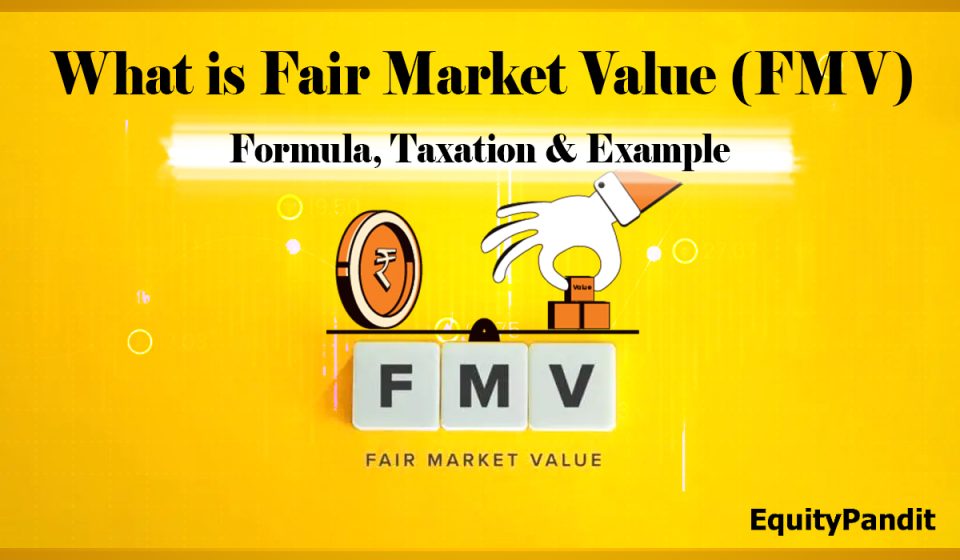Introduction
Fair Market Value (FMV) is the price an asset would sell for in current market conditions when both buyer and seller aim for the best deal. It’s often used in legal cases to determine an asset’s value.
Fair Market Value is used in areas like mergers, taxes, financial reporting, and legal cases. A survey of 200 finance experts showed 75% use FMV in their work.
What is Fair Market Value (FMV)?
Understanding Fair Market Value is vital to sound financial decisions. Condition, location, and market demand are important factors that can affect the FMV of an asset. Typically, a Comparative Market Analysis (CMA) comparing recent sales of similar assets is necessary.
FMV ensures good deals to both buyers and sellers. For example, if you are selling a house, then you will consider its location, condition, and real estate demand in the area. Reviewing recent sales of similar properties helps estimate the FMV. Suppose you estimate your house’s FMV at Rs 5 Cr and list it for sale. A buyer offers Rs 4.8 Cr, and FMV serves as a benchmark for negotiation to reach a mutually agreeable price. Similarly, understanding FMV is valuable when evaluating investment opportunities.
Real-World Examples of Fair Market Value (FMV).
Fair Market Value is widely used in finance, real estate, taxation, and business valuation.
- FMV helps estimate property values at the time of a real estate transaction so sellers do not overprice and buyers avoid overbuying.
- Business valuations use FMV to evaluate the value of a business, including its assets and liabilities. It is invaluable in mergers, shareholder disputes or estate planning.
- The tax authorities use FMV to calculate the value of assets for tax purposes, like calculating deductions on charitable giving.
- Investors use FMV when making judgements to invest in companies or assets, guiding them on whether to proceed with investing.
Fair Market Value (FMV) and Its Role in Taxation
In taxation, FMV helps determine the taxes owed when selling, donating, or inheriting an asset.
Tax on sale: When selling an asset, the taxpayer pays capital gains tax on the profit, calculated by subtracting the purchase price from the sale price. If the sale price is lower than the FMV, the taxpayer may have a capital loss, which can reduce other taxes owed.
Tax on donations: When donating an asset, the taxpayer can claim a tax deduction based on the FMV at the time of donation.
Tax on inheritance: FMV is used to determine the value of an inherited asset. This value sets the basis for calculating future capital gains tax when the asset is sold.
For example, if you sell a property for more than its FMV, you pay taxes on the difference. Similarly, if you inherit or receive a gift worth more than its FMV, you may owe taxes on the excess value.
How to Determine Fair Market Value (FMV)?
To calculate the Fair Market Value (FMV) of an asset, follow these six steps:
Define the asset: Identify the specific details of the asset you’re evaluating.
Research comparable sales: Look at similar assets that have recently been sold to understand the market value.
Adjust for differences: Modify the value based on any unique features or differences between the comparable sales and the asset in question.
Consider income potential: For income-generating assets, factor in the potential income they could provide.
Consult experts: Get advice from professionals who can provide accurate insights on the asset’s value.
Determine a final value: After researching and adjusting for differences, calculate the final FMV.
For example, in mutual funds, Fair Market Value (FMV) is referred to as the Net Asset Value (NAV), which is the market price of a mutual fund unit. Investors buy and sell mutual fund units at the NAV.
The formula to calculate the same is:
Net Asset Value = [Total Assets – (Expenses + Liabilities)] / Total Outstanding Units
Fair Market Value (FMV) vs. Market Value (MV)
Fair Market Value (FMV) and Market Value (MV) are related but used differently:
FMV is that price an asset would sell for in a competitive market, both buyer and seller know or fairly should know of, and the asset is sold under no compulsion. It is primarily utilised in taxation, courts of law, and insurance as an objective value.
Market Value is the real price that an asset would sell at in the actual market depending on the forces like demand, supply, economic conditions, and investor sentiment. It can change quickly and need not always show the true worth of an asset.
Frequently Asked Questions (FAQs)
How do you calculate Fair Market Value?
To calculate Fair Market Value, consider factors like the asset’s actual selling price and the cost of similar assets.
What is an example of Fair Market Value?
FMV is used in property taxes, charity donations, gifts, and the stock market. Each asset type has specific features to help determine its FMV.
What is the difference between fair value and market value?
Fair value is agreed upon by the buyer and seller, while market value is influenced by demand and supply.
How to find the Fair Market Value of a property?
The FMV of a property depends on its asking price and how willing the buyer is to purchase it. If the price is too high, the property may stay unsold for a long time but may eventually sell at a higher price.
What do you mean by Fair Market Value?
Fair Market Value is the estimated price an asset would sell for if sold today in the open market.
Unlock profitable opportunities every day! Unicorn Signals provides actionable intraday trading signals for stocks and futures. Don’t miss out – download Unicorn Signals and start winning now!






